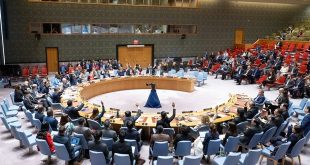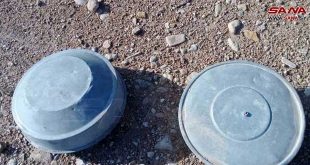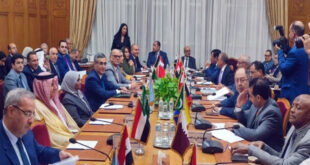New York, SANA, “Syria welcomes the UN Security Council Resolution 2199 to crack down financing terrorist groups through illicit oil sales, trading in antiquities and paying ransom for hostages” and highly appreciates Russian and Chinese delegations in this regard, Syria’s Permanent envoy to the UN Dr. Bashar al-Jaafari said.
Earlier Thursday, the United Nations Security Council unanimously adopted a Russian-sponsored resolution that calls for pulling the plug on funding terrorist organizations, including ISIS and Jabhat al-Nusra.
Al-Jaafari, during a joint press conference with the Iraqi envoy to the UN, said.. the resolution (2199) is very important for both Syria and Iraq, which are the main victims of the foreign intelligence and forces backed terrorism, pointing out that terrorists in the region, particularly in Syria and Iraq, do not come by parachutes but rather across joint borders of both countries and the majority of them (terrorists) cross into Syria and Iraq from Turkey and Jordan.
“Unfortunately, Jordan, a member of the Security Council, has adopted for years the policy of training, supporting and sending terrorists across the joint border into Syria to kill Syrians, and the Jordanian authorities see terrorists in the Syrian city of Al-Raqqa but do not see them while crossing its border towards Syria and Iraq”, Syria’s envoy said.
Resolution 2199 completes former resolutions related to fighting terrorism, including resolutions 2170 and 2178, al-Jaffari said, adding that the newly adopted resolution imposes serious commitments over member states which support terrorism in Iraq and Syria, and such commitments treat, particularly, trading oil and gas and smuggling archeological and cultural properties in a way that prevent terrorists to get financed from them.
Al-Jaafari said.. now we have three resolutions over fighting terrorism, and Turkey is still allowing terrorists, particularly from Islamic State in Iraq and Syria (ISIS) and Jabhat al-Nusra, to cross the joint border with Syria, as Israel assists terrorists in Golan, particularly Jabhat al-Nusra.
He added that terrorists come from Jordan, which established camps, or what they call joint operation centers, to train terrorists then send them to Syria under observation of intelligence services of the US, Israel, Turkey, France, Qatar and Saudi, and they call those terrorists (Moderates) while the Security Council resolution points out that there is no moderate or extremist terrorists and the resolution obligates fighting terrorism and all forms of terrorist acts perpetrated by ISIS, Al-Nusra and all other terrorist organizations.
“Training centers established in Turkey, Saudi, Qatar and Jordan are not for means of peaceful negotiations to find out political solutions but rather are death-making camps for Syrians”, Syria’s UN envoy said, indicating those who legitimize trading Syrian oil for those terrorists and call them (Armed opposition forces), following stealing Iraq and Syria’s oil and exporting it after being reined at the Turkish refineries and European companies import it via Turkish mediators.
Concluding his statement, Al-Jaafari wondered whether the time has arrived to fight terrorism seriously, and why there still are some countries are waiting till terrorism knocks their doors and hits different nations without any distinction from America to Asia, Africa, Europe and Oceania.
For his part, the Iraqi envoy Mohamad Ali al-Hakim pointed out the comprehensiveness of the resolution in preventing dealing with terrorists exporting oil, ransoming, and other economic issues that might be of benefit to terrorists in Iraq and Syria.
Al-Hakim called the resolution as “very important” under chapter seven and that for Iraq the resolution 2199 attempts to freeze and destroy terrorists financing sources particularly ISIS and Al-Nusra, expressing appreciation to a number of states including Russia and China for their efforts to issue the resolution under chapter seven.
In the course of the press conference, al-Jaafari was asked about whether the newly-approved resolution could be considered incomprehensive as it doesn’t include measures to force countries to control their borders in the face of the terrorists and stolen oil and archeological items.
To that he answered “The United States should be the first to abide by this resolution, an act through which it could give credibility to its claim that it is fighting terrorism.”
He explained this need for abidance on the US’s part by stressing that the US and its “wrong” counterterrorism policies in Afghanistan are to blame for the current spread of terrorism all over the world.
Clear evidence for this placing of blame is seen in the current U.S. administration providing assistance to some terrorist organizations inside Syria and in neighboring countries at camps that have been set up for the purpose of training terrorists to cross border to kill the Syrians inside the Syrian territory, al-Jaafari added.
He referred to four camps openly operating for training the terrorists which are located in Turkey, Jordan, Qatar and Saudi Arabia, stressing that all the four camps are run by secret intelligence services, including the CIA of the US and the Mossad of Israel.
Al-Jaafari affirmed that the U.S. administration did inform Syria of its intention to launch airstrikes against ISIS inside the Syrian territory before launching any, answering a question about the effect of the relationship between Syria and the US on coordination in any possible ground operations against ISIS.
Washington, he said, cannot deny the “very important role” of the Syrian government and President Bashar al-Assad in fighting terrorism, stressing that Syria is open to cooperation with all member states for combating terrorism.
“Yet, we need to see a real cooperation, one that is not based on double standards,” he added.
As for some other countries that are involved in supporting the terrorists, al-Jaafari ruled out the possibility that Turkey would abide by the resolution 2199 as it has not done so as far as resolutions 2170 and 2178 are concerned.
Turkey, he regretted, is involved with the terrorist war against Syria up to its ears, and, unfortunately, Jordan seems to have taken the same path.
On the idea of establishing a regional force to follow up on the implementation of the newly issued resolution, al-Jaafari again reiterated Syria’s readiness to cooperate with everybody and with any country with a “sincere agenda” for fighting terrorism.
Barry Temmo/Haifa Said
 Syrian Arab News Agency S A N A
Syrian Arab News Agency S A N A




